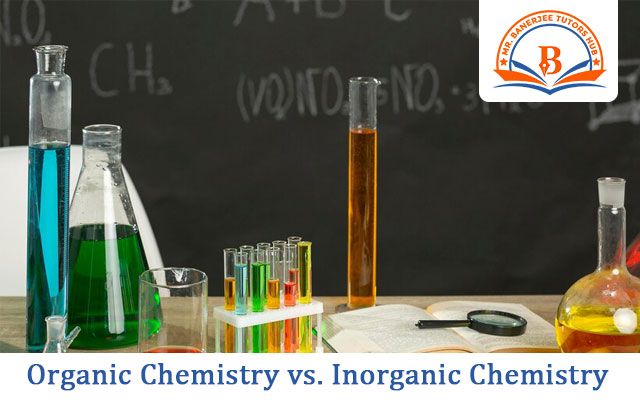Chemistry is one of the fundamental building blocks of our world and this universe and it is broadly divided into two fascinating branches – Organic Chemistry and Inorganic Chemistry. These two disciplines delve into the intricacies of molecular and atomic chemistry, each dealing with a very unique sub-division of the discipline. In this blog, we are going to be looking into the details and intricacies of organic and inorganic chemistry and why students should be excited to explore them.
If you want to know more about such important topics on chemistry, then make sure to find a home tutor for chemistry from Mr. Banerjee Tutors’ Hub.
Organic Chemistry:
- Organic chemistry primarily deals with the study of carbon compounds. Carbon forms the backbone of organic chemistry since carbon has the ability to form a diverse range of bonds and compounds. A common example of such bonds would be the simpler group of hydrocarbons gradually developing into more complex structures.
- Organic chemistry also deals with the atomic and molecular study of organic matter or simply living matter or organisms.
- The industries in which organic chemistry plays a crucial role includes biotechnology, petroleum industry, cosmetic industry, textile industry, pharmaceutical industry and so on.
Inorganic Chemistry:
- Inorganic Chemistry, on the other hand, deals with the broad divisions of chemical compounds which do not fall under the umbrella of the carbon family. For example, metals, minerals and salts.
- Inorganic chemistry forms the fundamental basis of industrial functions. The branch of study and research deals with optimising the use of metals and compounds in industrial processes to maximise yield and create premium-quality products, inorganic chemistry is very important.
- The industries in which inorganic chemistry plays a crucial role includes chemical industries, fertiliser industries, metallurgy industries, fuel industries, pharmaceutical industries and so on.
What are the Benefits of Studying Chemistry?
- Both organic and inorganic chemistry are directly applicable in our day-to-day lives. From the medicines we take to the machinery that we use, everything is a product of either of the two branches of chemistry.
- Chemistry as a discipline promotes creative thinking and problem-solving abilities.
- A strong foundation in chemistry opens doors to a myriad of career opportunities. From research to pharmaceuticals, materials science, environmental sciences, professorship, a career in teaching or becoming a home tutor yourself, you will have the opportunity to establish yourself as a professional in this field.
Conclusion:
In conclusion, the world of chemistry is an awe-inspiring tapestry woven from the threads of organic and inorganic particles. I found some of the chemistry tutors near me from Mr. Banerjee Tutors’ Hub and they helped me immensely. If you wish to improve your chemistry and pursue a bright and shining career in this field, I would suggest that you do that as well. Whether you’re drawn towards the intricacies of carbon compounds in organic chemistry or captivated by the dynamic world of elements and atoms in inorganic chemistry, the study of chemistry is a journey of discovery and endless possibilities.

